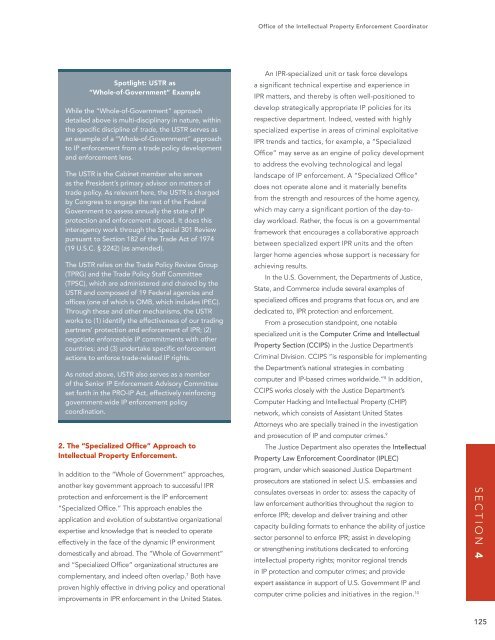ENFORCEMENT
eop_ipec_jointstrategicplan_hi-res
eop_ipec_jointstrategicplan_hi-res
Create successful ePaper yourself
Turn your PDF publications into a flip-book with our unique Google optimized e-Paper software.
Office of the Intellectual Property Enforcement Coordinator<br />
Spotlight: USTR as<br />
“Whole-of-Government” Example<br />
While the “Whole-of-Government” approach<br />
detailed above is multi-disciplinary in nature, within<br />
the specific discipline of trade, the USTR serves as<br />
an example of a “Whole-of-Government” approach<br />
to IP enforcement from a trade policy development<br />
and enforcement lens.<br />
The USTR is the Cabinet member who serves<br />
as the President’s primary advisor on matters of<br />
trade policy. As relevant here, the USTR is charged<br />
by Congress to engage the rest of the Federal<br />
Government to assess annually the state of IP<br />
protection and enforcement abroad. It does this<br />
interagency work through the Special 301 Review<br />
pursuant to Section 182 of the Trade Act of 1974<br />
(19 U.S.C. § 2242) (as amended).<br />
The USTR relies on the Trade Policy Review Group<br />
(TPRG) and the Trade Policy Staff Committee<br />
(TPSC), which are administered and chaired by the<br />
USTR and composed of 19 Federal agencies and<br />
offices (one of which is OMB, which includes IPEC).<br />
Through these and other mechanisms, the USTR<br />
works to (1) identify the effectiveness of our trading<br />
partners’ protection and enforcement of IPR; (2)<br />
negotiate enforceable IP commitments with other<br />
countries; and (3) undertake specific enforcement<br />
actions to enforce trade-related IP rights.<br />
As noted above, USTR also serves as a member<br />
of the Senior IP Enforcement Advisory Committee<br />
set forth in the PRO-IP Act, effectively reinforcing<br />
government-wide IP enforcement policy<br />
coordination.<br />
2. The “Specialized Office” Approach to<br />
Intellectual Property Enforcement.<br />
In addition to the “Whole of Government” approaches,<br />
another key government approach to successful IPR<br />
protection and enforcement is the IP enforcement<br />
“Specialized Office.” This approach enables the<br />
application and evolution of substantive organizational<br />
expertise and knowledge that is needed to operate<br />
effectively in the face of the dynamic IP environment<br />
domestically and abroad. The “Whole of Government”<br />
and “Specialized Office” organizational structures are<br />
complementary, and indeed often overlap. 7 Both have<br />
proven highly effective in driving policy and operational<br />
improvements in IPR enforcement in the United States.<br />
An IPR-specialized unit or task force develops<br />
a significant technical expertise and experience in<br />
IPR matters, and thereby is often well-positioned to<br />
develop strategically appropriate IP policies for its<br />
respective department. Indeed, vested with highly<br />
specialized expertise in areas of criminal exploitative<br />
IPR trends and tactics, for example, a “Specialized<br />
Office” may serve as an engine of policy development<br />
to address the evolving technological and legal<br />
landscape of IP enforcement. A “Specialized Office”<br />
does not operate alone and it materially benefits<br />
from the strength and resources of the home agency,<br />
which may carry a significant portion of the day-today<br />
workload. Rather, the focus is on a governmental<br />
framework that encourages a collaborative approach<br />
between specialized expert IPR units and the often<br />
larger home agencies whose support is necessary for<br />
achieving results.<br />
In the U.S. Government, the Departments of Justice,<br />
State, and Commerce include several examples of<br />
specialized offices and programs that focus on, and are<br />
dedicated to, IPR protection and enforcement.<br />
From a prosecution standpoint, one notable<br />
specialized unit is the Computer Crime and Intellectual<br />
Property Section (CCIPS) in the Justice Department’s<br />
Criminal Division. CCIPS “is responsible for implementing<br />
the Department’s national strategies in combating<br />
computer and IP-based crimes worldwide.” 8 In addition,<br />
CCIPS works closely with the Justice Department’s<br />
Computer Hacking and Intellectual Property (CHIP)<br />
network, which consists of Assistant United States<br />
Attorneys who are specially trained in the investigation<br />
and prosecution of IP and computer crimes. 9<br />
The Justice Department also operates the Intellectual<br />
Property Law Enforcement Coordinator (IPLEC)<br />
program, under which seasoned Justice Department<br />
prosecutors are stationed in select U.S. embassies and<br />
consulates overseas in order to: assess the capacity of<br />
law enforcement authorities throughout the region to<br />
enforce IPR; develop and deliver training and other<br />
capacity building formats to enhance the ability of justice<br />
sector personnel to enforce IPR; assist in developing<br />
or strengthening institutions dedicated to enforcing<br />
intellectual property rights; monitor regional trends<br />
in IP protection and computer crimes; and provide<br />
expert assistance in support of U.S. Government IP and<br />
computer crime policies and initiatives in the region. 10<br />
SECTION 4<br />
125


